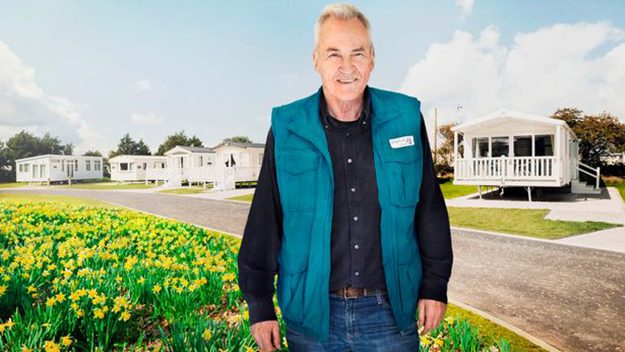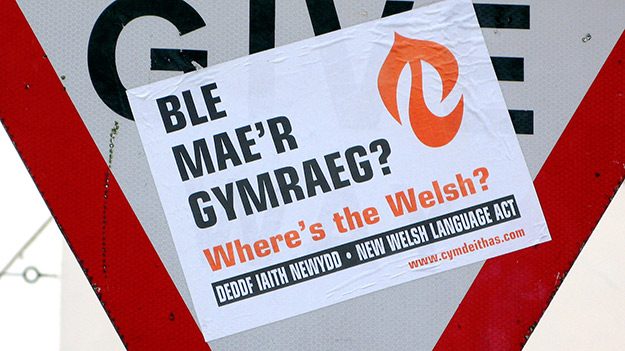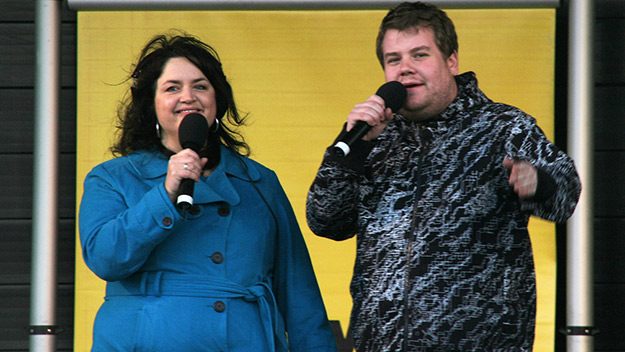The Welsh language is constantly undermined by English-language broadcasters, and The BBC’s latest sitcom is no exception, argues Fflur Evans.

The first ever scene of the BBC’s latest sitcom, Pitching In, shows a figure dressed in white on a Welsh mountaintop shouting “Cenedl heb iaith, cenedl heb galon”, which roughly translates to “a country without a language is a country without a heart”.
Now, this is a programme in which the representation of the language takes the form of blink-and-you’ll-miss-it snippets of a “bach” or a “diolch” at the end of a sentence, so this opening scene is just dripping with irony. Whether this was intended as a ridiculing of the Welsh language, I’m unsure, but it smacks of tone-deaf writing.
Watching Pitching In, you wouldn’t be blamed for thinking that the Welsh language only exists in this country on road signs. Set in a caravan park on the island of Anglesey (Ynys Môn), the Larry Lamb-fronted “comedy” seems to be the BBC’s latest attempt to pander to its Welsh audience, but they’ve missed the mark entirely.
There’s been somewhat of a national outrage towards the sitcom on social media, with which I can only agree. To say that the Welsh language is at all depicted in this sitcom is a stretch in itself, as we are shown this strange, parallel universe version of Anglesey in which the Welsh language is almost non-existent.

Delyth Jewell AM, who is Shadow International Affairs & Culture Minister of Wales, calls Pitching In a “sub-standard ‘comedy’ showing Wales through English eyes,”and this is exactly the problem. The English writers behind Pitching In have no sense of the pride that comes from hearing the Welsh language on-screen, as they’re inundated with English-language channels compared to Wales’ one. As a Welsh speaker, it’s frustrating to see your first language erased from this narrative, as the BBC wastes another opportunity to make good Welsh TV.
However, we can’t put the blame solely on English writers, as many sitcoms with Welsh writers haven’t done justice to the Welsh language either. Ruth Jones, from Bridgend, is well-known for her excellent sitcoms, but watching these from a Welsh-speaking perspective can often be painful.

Take, for example, Gavin and Stacey, a popular sitcom detailing the romance between a boy from England and a girl from Wales. Jones co-wrote this with English writer James Corden, and although it may not completely erase the Welsh language from our screens, the depictions of Wales speakers are usually solely for comedic purpose.
For example, the ‘Welsh nationalists’ (named as such for simply speaking the language) are portrayed as crazy, uncontrollable, and to be stayed away from, like feral animals. They’re the butt of the joke simply for speaking Welsh – the most offensive of said jokes being the memorable “one sniff of an English accent and they’ll lynch you”. Wonderful.
Jones’ other successful sitcom, Stella, set in the South Wales fictional village of Tonyberry, certainly provides a more positive view of Welsh culture, but its portrayal of the language leaves a lot to be desired. One character, simply named Daddy, speaks in a gibberish language, which everyone in the village seems to understand, but the writers just can’t seem to resist classic “Is he speaking Welsh?” jokes. Hilarious.
The success of these sitcoms over the border only rubs more salt in the wound, encouraging the English to consider our language as laughable or dying.
It’d be so easy for the BBC to depict the language, and Welsh identity as a whole, in a more favourable manner, as there are plenty of good examples for them to follow. Many S4C (our Welsh-language channel) dramas have been adapted for English audiences and broadcast on the BBC, for example. Some of these, like Celtic Noir dramas Y Gwyll (‘Hinterland’ in English) and Craith (‘Hidden’) were filmed in both Welsh and English, but included some scenes in Welsh with English subtitles, even in the BBC version:
.embed-container { position: relative; padding-bottom: 56.25%; height: 0; overflow: hidden; max-width: 100%; } .embed-container iframe, .embed-container object, .embed-container embed { position: absolute; top: 0; left: 0; width: 100%; height: 100%; }
There was no mistaking that you were watching a Welsh drama, by Welsh writers, starring Welsh actors. By seamlessly including Welsh dialogue in with the English, it showed that representing the language doesn’t require an enormous amount of effort. Plenty of people watch foreign language films, so a few scenes of Welsh dialogue with subtitles shouldn’t be hard, especially in a sitcom based on Ynys Môn, where about 65% of the population speak Welsh. Pitching In‘s Welsh viewers seem to agree that the BBC should look to S4C for tips:
language. The BBC cited Hinterland, Keeping Faith and the recent acquisition of Bang as a sign of their commitment to promoting and normalising the Welsh language. All of these series originated on S4C. When left to their own devices with series like #PitchingIn what happens?
— Huw Marshall (@huwmar) 21 February 2019
Luckily, there are people out there who are prepared to challenge English-language broadcasters for their skewed representations of the language and of Wales as a whole. Assembly Member Bethan Sayed has confronted BBC Wales Director, Rhodri Talfan Davies, saying : “In February 2017, the BBC announced ‘an additional £8.5m per annum of funding for English language programming for Wales… What is the current level of investment for this target?” The people of Wales have also made their voices heard about Pitching In, and hopefully, if our English-language broadcasters are wise enough to listen, we won’t have to suffer through one more hour of daffodil jokes and dodgy accents ever again.
